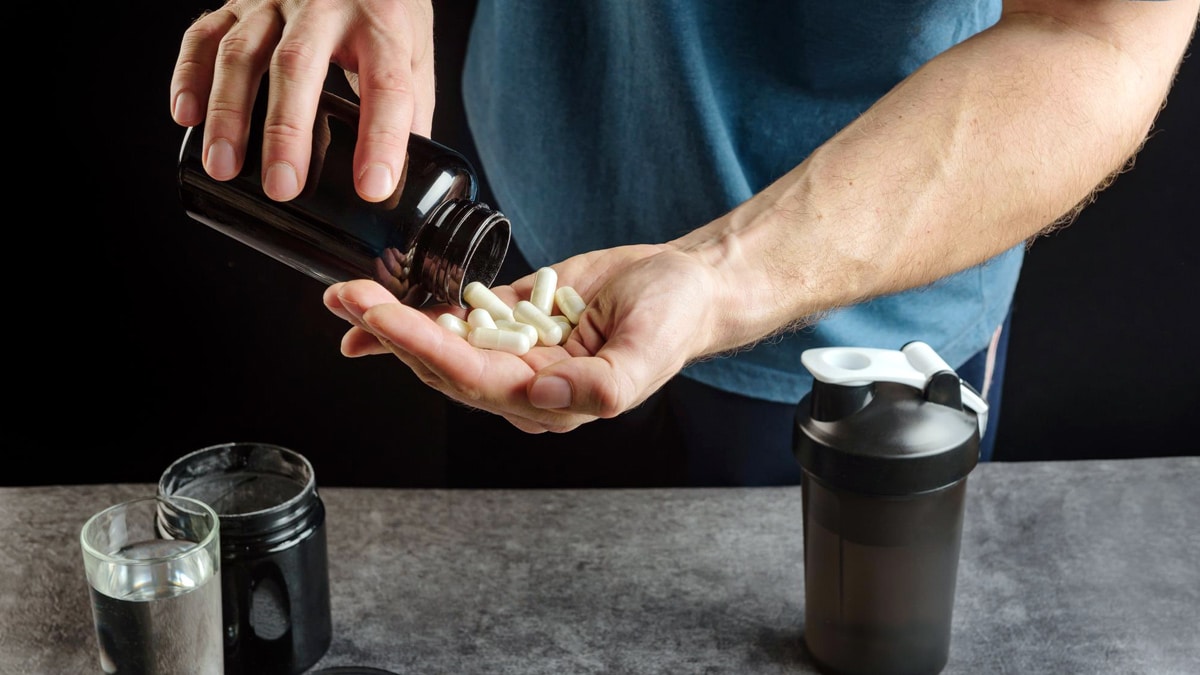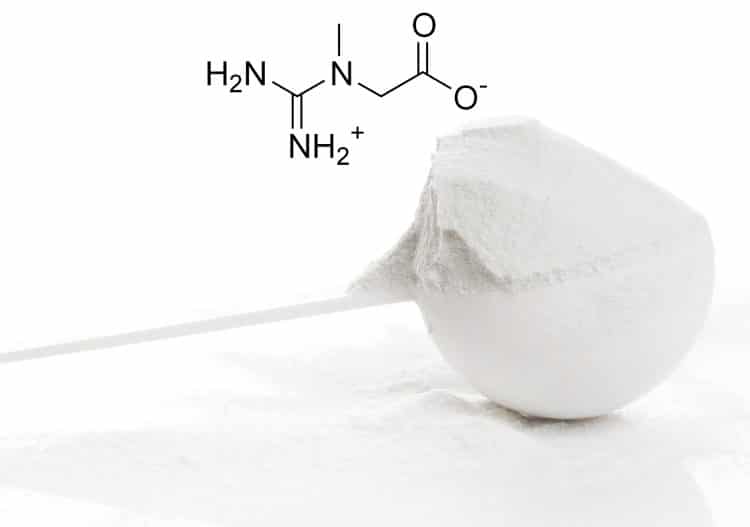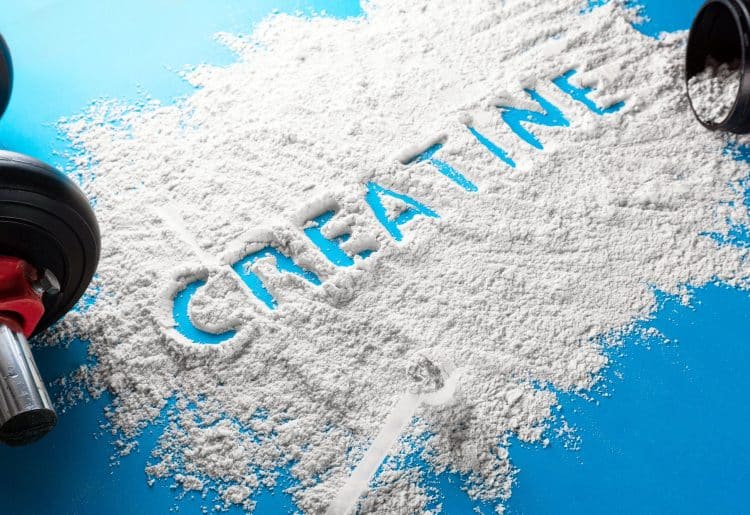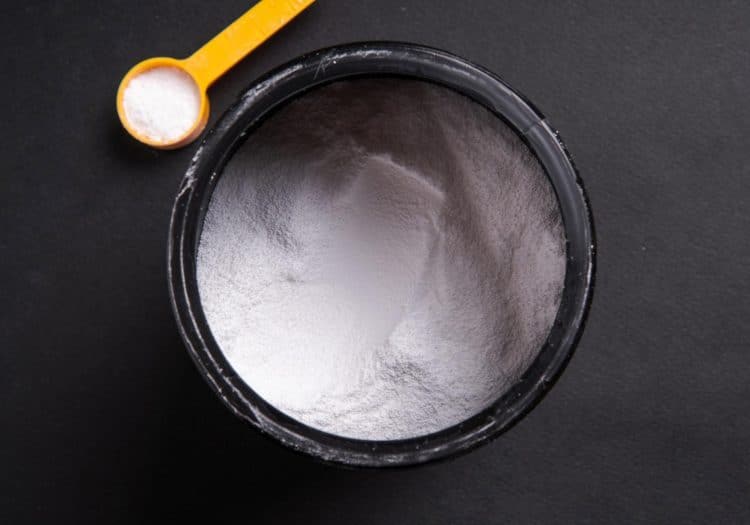We live in challenging times where the paradox of choice has besieged us. Enter a supplement store, and you’ll see the same supplements in different forms: powder, pill, tablet, gummies, and liquid. Since we demand the best bang for our buck, we want to ensure we go with the best option. The choice, however, isn’t always easy.
On the other hand, some people purchase any supplement they can get their hands on, opining that although they have different forms, these supps have the same potency and results because they use the same ingredient. It is not always the case.
Creatine is a popular supplement in the health and fitness industry. It has quickly become a staple in most serious strength sports athletes’ routines.
Creatine can help build muscle mass, boost energy, shorten recovery time between sets, reduce fatigue, lower blood sugar levels, improve brain function, and aid in fighting neurological diseases [1][2]. Plus, it is one of the most budget-friendly supps on the market. If you are a bodybuilder who has just discovered creatine, you probably already have your credit card on the table after reading about its benefits.
Sports nutrition companies realized creatine’s potential early in the product’s life cycle and set plans to milk the supplement in motion. Although this might sound like a master plan by evil corporates (which it is a little bit), it brings value to the users by delivering several options.
Many popular brands offer creatine in powder and pill form. This article breaks down the benefits and differences of each. You’ll also learn which form delivers the best value.
Check Out: 12 Best Creatine Supplements of 2024 Reviewed & Ranked
What is Creatine?
Creatine is an organic compound that occurs naturally in the body. It’s also present in red meat and seafood. Creatine works like amino acids and helps build protein. The amino acids glycine and arginine create creatine in the liver and kidneys.
About 95 percent of the body’s creatine is in phosphocreatine form in the muscles, and the remaining five percent is in the brain and testes. [3]
Creatine supplements increase phosphocreatine stores, a form of stored energy in the cells that help your body produce adenosine triphosphate (ATP). ATP is a high-energy molecule that can improve your training performance, especially in high-intensity activities such as weightlifting and sprinting.
Although creatine is produced naturally in the body, most people cannot maximize their creatine stores using a whole-food diet. According to research, people who regularly eat red meat and seafood can only achieve 60-80 percent creatine muscle saturation. Creatine supplements can help them fill the void.
Benefits of Creatine
Creatine is a must-have for serious athletes as it can:
1. Helps Build Bigger and Stronger Muscles
According to a study, creatine monohydrate is the world’s most effective supplement for increasing high-intensity exercise capacity and lean body mass. Intermediate lifters can see increased muscle mass within 5-7 days of using creatine. The initial muscle gain, however, is mainly because your muscles start holding water. [4]
2. Boost Energy Levels
Creatine supplements work by increasing your phosphocreatine reserves. Phosphocreatine boosts ATP production, improving your performance in high-intensity exercises and daily chores.
3. Reduces and Delays Fatigue
A study found that supplementing with creatine reduced fatigue and increased energy levels. The higher phosphocreatine levels and quick ATP replenishment keep your energy levels high and delay the onset of fatigue. [5]
4. Might Lower Blood Sugar Levels and Fight Diabetes
Creatine supplements can help lower blood sugar levels by increasing glucose transporter type 4 (GLUT-4) molecules’ function of bringing blood sugar into your muscles.
5. It May Help With Parkinson’s Disease
A significant reduction in dopamine levels mainly causes Parkinson’s disease. It results in brain cell death and several severe symptoms, including tremors, speech impairments, and loss of muscle function.
A study concluded that creatine prevented a 90 percent typical drop in dopamine levels in mice. More research, however, is needed to establish the same effects in humans. [6]
6. It May Keep Away Other Neurological Diseases
Phosphocreatine reduction in your brain causes many neurological disorders. Regular creatine supplementation can prevent or slow down disease development by increasing your phosphocreatine levels.
7. Enhances Brain Function
Research shows your brain needs significant ATP when performing demanding tasks. Creatine supplements can boost ATP production and prove a potent nootropic supplement.
8. Budget-Friendly
Creatine has several benefits and is effective. Its biggest asset, however, is its price. Unlike other sports supplements, a high-quality creatine monohydrate powder doesn’t burn a hole in your wallet.
Types of Creatine
Creatine’s success led companies to invest in research and development of better variants.
Some of the most popular creatine supplements are:
- Creatine Monohydrate
- Creatine HCL
- Buffered Creatine
- Creatine Ethyl Ester
- Creatine Magnesium Chelate
- Liquid Creatine
Creatine monohydrate is the basic and most popular form of creatine. Creatine HCL and ethyl ester improve creatine monohydrate’s insolubility and texture. Although these variants have better mixability, there is no evidence they are more effective than monohydrate.
Related: Creatine Monohydrate Vs. HCL: What’s the Difference?
Why Supplements Are Available in Different Forms
Creatine comes in different forms, but they all have the same benefits. This might make you wonder why supplement companies produce various forms of creatine. It is because of the following reasons:
Convenience
User convenience and lifestyle are the most significant factors behind creating different forms of the same supplement. For example, people who hit the gym after work might find it more convenient to carry creatine pills than powder. The powder has a higher probability of spilling in your bag. Plus, pills ensure you get the exact dosage per serving to boost results.
Potency
Different forms of a supplement have different potencies. Powdered supplements are the most potent, and liquid supplements are considered the least potent because of ingredient dilution.
Absorption and Bioavailability
Powder supplements are the most bioavailable form of supplement, meaning they are the quickest to absorb in your gut. On the other hand, pills take a little longer to be absorbed as they need to be broken in the stomach before the ingredients are made available to the muscles. Furthermore, some supplements do better in one form than others due to your gut environment.
Ingredient Stability
Different companies have varying manufacturing processes. Depending on the ingredient, they might prefer one form over the other because of its stability. A product’s uniformity and stability can influence its bioavailability.
Next Read: How Long Does it Take for Creatine to Work?
Difference Between Creatine Powder and Pills
Most creatine powder supplements are single-ingredient supps, meaning they deliver 100 percent creatine per serving.
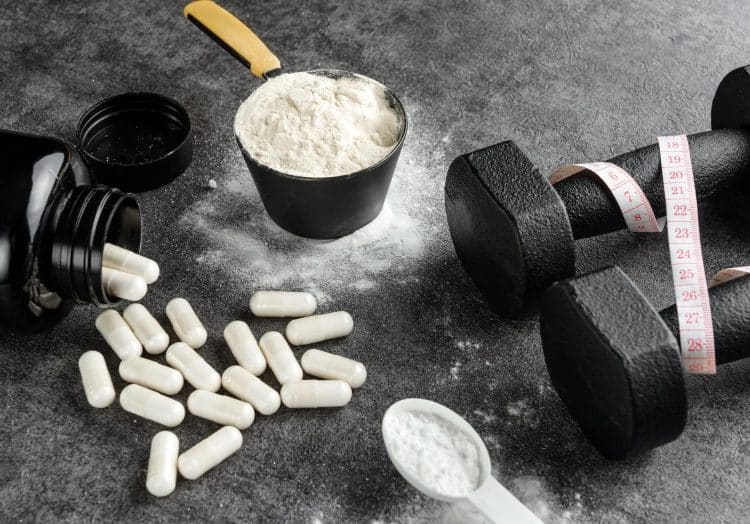
Creatine pills are creatine inside a capsule. Creatine pills have two ingredients — creatine and gelatin. Gelatin is derived from collagen taken from animal body parts and is used to make capsules. Plant-based capsules use HPMC (cellulose) or pullulan (tapioca root extract).
Below are a few things to consider before choosing between a creatine powder and a pill:
Convenience
You should prefer creatine pills if you keep your supplement in your office or gym bag. Dumping a scoop of creatine into a shaker bottle or dry scooping can cause a lot of mess, which your colleagues might not appreciate. Plus, creatine pills ensure there is no spillage.
Creatine monohydrate is infamous for its mixability. You’ll have difficulty dissolving it in a shaker bottle or a glass, and then you have to cope with its muddy texture. You could save yourself all this trouble by swallowing a creatine pill.
Must Read: Should You Dry Scoop Creatine? — Benefits, Risks, & Effectiveness
Bioavailability
Folks that train early morning or right after work should favor creatine powder. Powdered supplements absorb quicker in your stomach. Your body starts absorbing powder creatine as soon as you take it.
On the other hand, your gut needs to break down the gelatin before it can get to the creatine. Depending on your digestive system, the gelatin capsule disintegration can take 15-30 minutes, after which the creatine digestion process begins.
Many lifters take creatine as a pre-workout supplement 15 minutes before a training session, as it can boost energy, endurance, and stamina. You should use a creatine powder supp if you fall into this category.
Exact Dosage
Different brands use different scoops in their powder supplements. These scoops are as accurate as the fat caliper at your gym. Creatine pills should be your pick if you are meticulous about supplement dosages.
Most creatine pills contain 2.5 grams of creatine per serving, and almost all creatine powder supplements deliver 3-5 grams of creatine per serving. You can, however, never be sure about the exact amount of creatine powder in each scoop.
Cost
Your monthly supplement budget can go out of hand quickly if you don’t keep a tab on it. Luckily, creatine is one of the most budget-friendly supps. It turns you into a super athlete without bankrupting you.
Creatine pills are usually more expensive than powder versions. For example, Optimum Nutrition Powdered Creatine retails for $68.99 for a 100-serving bottle, whereas the pill form supp retails for $76.99. The good news, however, is that both variants are still cost-effective and last you more than three months.
Check Out: Best Creatine Supplements of 2024
Adding To Other Supplements
Some lifters prefer mixing their creatine with other supplements like whey protein, BCAA, or pre-workouts. Others like to keep things simple and take one supp at a time. Your creatine pick could vary depending on your preferences.
If you like combining it with other supplements, you should choose a creatine powder. Folks that want to ride solo will be better off with a creatine pill supp.
Pros and Cons of Creatine Powder and Pills
Here are the pros and cons of creatine powder and pills that you should consider:
Advantages and Disadvantages of Creatine Powder
Creatine powders are the most common among fitness enthusiasts. It is one of the most inexpensive supplements on the market. Creatine powder is versatile. You can add it to other supplements like whey protein shakes and pre-workout or intra-workout drinks. Plus, it can also complement healthy recipes.
Creatine powders are cheaper than pill variants. It can save you a lot of money, especially during the creatine-loading phase. Furthermore, creatine monohydrate is quickly and easily absorbed in your gut, making it a perfect pre-workout ingredient.
| Pros | Cons | |
| 1 | Creatine powder is cheaper than the pill variant. | It has poor mixability. |
| 2 | It is versatile and can be blended with other supplements and used in recipes. | Creatine powder has a muddy texture. |
| 3 | Better absorbability. | It can create a mess. |
On the flip side, creatine powders have poor mixability in liquids. It almost sticks to the bottom of a shaker bottle or glass. You have to pour water into the glass multiple times, and when you get all the creatine in your system, it will leave a muddy aftertaste that lasts a few minutes.
Powdered supplements can create a mess as you put them into a shaker bottle. They are also hard to transport and consume while on the go.
Advantages and Disadvantages of Creatine Pills
Creatine pills are the right fit for you if you’re always on the move. These pills are as big as your index fingernail, making them easy to swallow. Transporting creatine pills is easy, and they never make a mess in your backpack.
Creatine pills deliver the exact amount of creatine per serving, taking the guesswork out of the equation. Additionally, you save yourself the trouble of mixing creatine in water and its muddy aftertaste by selecting creatine pills.
| Pros | Cons | |
| 1 | Convenient to carry. | It takes longer to digest. |
| 2 | Perfect dosages. | Consuming multiple creatine pills can become cumbersome. |
Creatine pills, however, take longer to digest as the gelatin capsules need 15-30 minutes to dissolve in your stomach. Although not recommended, you could get creative with creatine pills and open up the capsules to speed up digestion.
Also, a two-capsule serving of creatine pills usually delivers 2.5 grams of creatine. Gulping four capsules every few hours can be a pain in the butt in the creatine-loading phase. Folks that despise pills should stick with creatine powders.
Also Read: How Much Water Should You Drink While Taking Creatine?
How To Take Creatine
Here are the two most common methods of taking creatine:
Loading Phase
In the loading phase, you consume 20 grams of creatine daily for 5-7 days. You should divide the dosages into four five-gram servings throughout the day. To get the best results, ensure you are hydrated throughout the day. Drink at least a gallon of water daily while supplementing with creatine.
Maintenance Phase
Switch to the maintenance phase after completing loading. In this stage, you consume 3-5 grams of creatine daily. You can stay in this phase for a long time, as cycling creatine has no benefits.
Also, you could skip the loading phase and start taking creatine in the maintenance doses. It will take 3-4 weeks to maximize your body’s creatine stores and achieve muscle creatine saturation if you start with the maintenance phase.
Frequently Asked Questions
Is creatine safe?
Creatine is a rigorously tested supplement. Research has shown that taking creatine supplements daily is safe, even over multiple years. People who took high doses of creatine (30 grams/day) for up to five years showed no significant detrimental side effects. [3]
Should you take creatine every day?
You can take creatine every day, even on non-training days. Supplementing with creatine spikes your phosphocreatine stores, which can help with ATP production. You should take 20 grams of creatine daily for 5-7 days and follow it up with 3-5 gram doses to achieve muscle saturation.
What is the best time to take creatine?
Research suggests that you should take creatine shortly before or after training on workout days. Although the timing is not important on rest days, you should take creatine with food to maximize results. [7]
Conclusion
Creatine is a super supplement. Not only does it improve your physical performance, but it also boosts your mental well-being. Owing to its popularity, creatine comes in different forms and types, of which creatine monohydrate in the power and pill forms are the most popular.
Although both creatine forms deliver spectacular value for money, each has its advantages and drawbacks. You should choose between creatine powder and pill depending on your lifestyle, needs, and preferences. The guidelines mentioned in this article help you pick the right product.
References
Fitness Volt is committed to providing our readers with science-based information. We use only credible and peer-reviewed sources to support the information we share in our articles.
- Branch JD. Effect of creatine supplementation on body composition and performance: a meta-analysis. Int J Sport Nutr Exerc Metab. 2003 Jun;13(2):198-226. doi: 10.1123/ijsnem.13.2.198. PMID: 12945830.
- Matthews RT, Ferrante RJ, Klivenyi P, Yang L, Klein AM, Mueller G, Kaddurah-Daouk R, Beal MF. Creatine and cyclocreatine attenuate MPTP neurotoxicity. Exp Neurol. 1999 May;157(1):142-9. doi: 10.1006/exnr.1999.7049. PMID: 10222117.
- Kreider RB, Kalman DS, Antonio J, Ziegenfuss TN, Wildman R, Collins R, Candow DG, Kleiner SM, Almada AL, Lopez HL. International Society of Sports Nutrition position stand: safety and efficacy of creatine supplementation in exercise, sport, and medicine. J Int Soc Sports Nutr. 2017 Jun 13;14:18. doi: 10.1186/s12970-017-0173-z. PMID: 28615996; PMCID: PMC5469049.
- Buford TW, Kreider RB, Stout JR, Greenwood M, Campbell B, Spano M, Ziegenfuss T, Lopez H, Landis J, Antonio J. International Society of Sports Nutrition position stand: creatine supplementation and exercise. J Int Soc Sports Nutr. 2007 Aug 30;4:6. doi: 10.1186/1550-2783-4-6. PMID: 17908288; PMCID: PMC2048496.
- McMorris T, Harris RC, Swain J, Corbett J, Collard K, Dyson RJ, Dye L, Hodgson C, Draper N. Effect of creatine supplementation and sleep deprivation, with mild exercise, on cognitive and psychomotor performance, mood state, and plasma concentrations of catecholamines and cortisol. Psychopharmacology (Berl). 2006 Mar;185(1):93-103. doi: 10.1007/s00213-005-0269-z. Epub 2006 Jan 17. PMID: 16416332.
- Matthews RT, Ferrante RJ, Klivenyi P, Yang L, Klein AM, Mueller G, Kaddurah-Daouk R, Beal MF. Creatine and cyclocreatine attenuate MPTP neurotoxicity. Exp Neurol. 1999 May;157(1):142-9. doi: 10.1006/exnr.1999.7049. PMID: 10222117.
- Antonio J, Ciccone V. The effects of pre versus post workout supplementation of creatine monohydrate on body composition and strength. J Int Soc Sports Nutr. 2013 Aug 6;10:36. doi: 10.1186/1550-2783-10-36. PMID: 23919405; PMCID: PMC3750511.
Tip: If you're signed in to Google, tap Follow.


